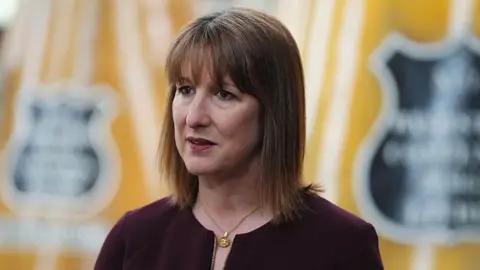Rachel Reeves warns of harder choices to come as she hints at tax rises
Becky MortonPolitical reporter
Rachel Reeves has said the government is facing difficult choices, as she promised she would not take risks with the public finances.
In her speech at Labour’s annual party conference in Liverpool, the chancellor pledged to keep “taxes, inflation and interest rates as low as possible”.
But hinting at further tax rises in November’s Budget, she said the government’s choices had been made “harder” by international events and the “long-term damage” done to the economy.
Reeves is facing a difficult Budget, with economists warning tax rises or spending cuts will be needed for the chancellor to meet her self-imposed borrowing rules.
Pressed over whether she would have to put up taxes in a BBC interview ahead of her speech, Reeves said “the world has changed” in the last year – pointing to wars in Europe and the Middle East, US tariffs and the global cost of borrowing.
“We’re not immune to any of those things,” she added.
If taxes do go up in the Budget, this prepares the ground for the government’s argument for why this is necessary.
Reeves criticised previous Conservatives governments, accusing Liz Truss of sending mortgage costs “spiralling” with her mini-budget.
And in comments that will be seen as a swipe at the Labour mayor of Greater Manchester, Andy Burnham, Reeves said: “There are still those who peddle the idea that we could just abandon economic responsibility and cast off any constraints on spending.
“They are wrong – dangerously so – and we need to be honest about what that choice would mean.”
Burnham has continued his vocal criticism of Sir Keir Starmer during Labour’s conference and has not ruled out a leadership bid.
However, he prompted a backlash from some Labour MPs after he suggested ministers were “in hock to the bond markets” – a reference to the government’s self-imposed rules limiting spending and borrowing.
Reeves also used her speech to criticise Reform UK, which has been topping opinion polls for several months, despite having only five MPs.
Labour has stepped up its attacks on the party at its conference.
“The single greatest threat to the way of life and to the living standards of working people is the agenda of Nigel Farage and the Reform Party,” the chancellor said.
“Whatever falsehoods they push, whatever easy answers they peddle, however willing they are to tear communities and families apart, they are not on the side of working people.”
There was one interruption to her speech, when a protester held up a Palestinian flag, and Reeves told him that Labour was “not a party of protest”. Merseyside Police later said there was “no police involvement”.
Coming two months ahead of the Budget, when the chancellor will set out the government’s tax and spending plans, Reeves’s speech was relatively light on policies.
She confirmed that young people who have been out of a job or education and receiving Universal Credit for 18 months will be offered a guaranteed paid work placement, as part of plans to tackle youth unemployment.
Those who refuse to take up the offer without a reasonable excuse will face sanctions such as losing their benefits.
Other announcements included:
- A pledge to fund a library in every primary school in England by the next election
- A new “hit squad” of investigators to target Covid fraudsters, with new powers to recover money lost to PPE contracts which failed to deliver
- New legislation to help ensure ships and steel are British-made







